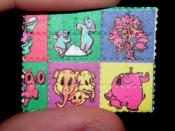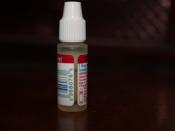LSD, the generic name for the hallucinogen, lysergic acid diethylamide-25, was discovered by Dr. Albert Hofmann in 1938, LSD is one of the most potent mind-altering chemicals known to man. A white, odorless powder usually taken orally, it's effects are highly variable and begin within one hour and generally last 8-12 hours, gradually tapering off. It has been used experimentally in the treatment of alcoholics and psychiatric patients. [Where it showed some success.]. Interest in the drug rose when it was thought that it might be a possible treatment for schizophrenia. In the 1960's-1970's hippies started to use the drug. It was their psychedelic drug of choice. Hippies could believe that they were flying without leaving the ground. This drug was used a lot until a lot of publicity about "bad trips".
The administration of very small doses of Delysid (1/2-2 ug. /kg. body weight) results in transitory disturbances of affect, hallucinations, depersonalization, reliving of repressed memories, and mild neuro-vegetative symptoms.
The effect sets in after 30 to 90 minutes and generally lasts 5 to 12 hours. However, intermittent disturbances of affect may occasionally persist for several days.
LSD is primarily a psychological hazard and not generally harmful to the body. May release latent psychosis or exacerbate depression, leading to irrational behavior. There is also a danger of foolish or incautious behavior, e.g., misjudging distances or thinking one can fly. Physical overdose is not a hazard, though one may easily ingest more than one may be able to handle psychologically. LSD is a very unpredictable drug. LSD gives the user rapid mood swings. The user gets a feeling that they are in another world. They get a feeling of euphoria. The effects last for up to 12 hours. LSD increases body temperature, increases heart rate and dilates the pupils. The...


